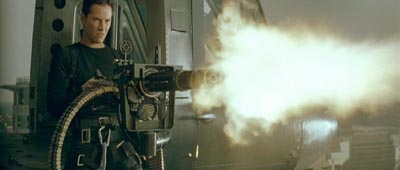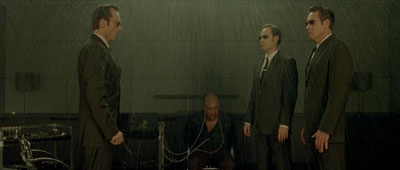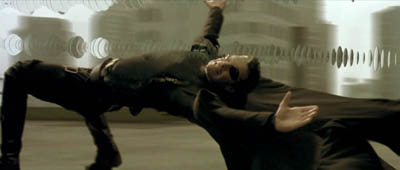The Matrix
Follow the white rabbit on an action-packed journey through the sci-fi looking glass.

Pre-1999, sci-fi movies were stuck in something of a rut. A breeding ground for nerdish escapist fantasies, the genre was becoming increasingly stale, and even attending the imminent release of The Phantom Menace felt more like a laboured necessity than an act of enthusiastic will. Fat, bearded, pony-tailed losers wearing 'Seven of Nine' t-shirts were doing nothing to alleviate the stifling image of your average fanboy, and yet something completely unexpected happened that turned the most undesirable genre in cinema into the most fashionable literally overnight. That thing was The Matrix.
The aesthetic catalyst for the resurgence of trench-coated Goth chic and nu-metal that has prevailed ever since, the movie didn't so much shake down a tired genre as smash it to little pieces, have rampant sex with it's female relatives and give birth to it all over again, redesigning the basic building blocks that constitute it's very being as it went. A mould broken, a template redesigned, and a whole new wave of cyberpunk cool that would permeate every tract of life, no matter how unrelated it was. Suddenly, geeks sitting in front of computer screens wearing black were cool again. Or at least so they were allowed to think.
Borrowing, reinventing, and sometimes downright pilfering a host of ideas from modern pop culture, the Bible, Gibson-esque cyberpunk values and Greek mythology, the Wachowski brothers had blended them altogether into a rich, complex and thoughtful whole, then injected the kind of wire-fighting Kung Fu action that would make even your granny want to dress up in black and learn Hap Ki Do.

For those not in the know (and I can only imagine that's a very small number), The Matrix works on the old sci-fi premise that the world as we know it is merely a virtual reality illusion. Behind the facade, a malevolent computer A.I. has the whole of humanity enslaved, force-feeding the fabricated world around us on our sleeping minds. As our bodies are harvested for energy in the war-ravaged Real World, so we happily spend our waking life wandering around the fabricated Matrix, blissfully unaware of the presence of controlling machines.
Keeping things in check are the Agents; a group of sentient computer programs whose job it is to police the Matrix and hunt down 'wakened' freedom fighters who would seek to regain control from the machines. Freedom fighters like Morpheus (Laurence Fishurne), leader of a motley crew who inhabit the good ship Nebuchadnezzer (reference to a biblical figure who searched for the meaning of a dream he couldn't fully remember) in an attempt to overthrow the evil automatons. His accomplices are Trinity (Carrie-Anne Moss), Tank (Marcus Chong), Apoc (Julian Arahanga), Switch (Belinda McClory), Dozer (Anthony Ray Parker), Mouse (Matt Doran) and the traitorous Cypher (Joe Pantoliano).
In their quest to end the war, the humans search for The One, a figure prophesied by the Oracle (the now sadly deceased Gloria Foster) who will free mankind from slavery. They believe they have found that figure in Thomas Anderson (Keanu Reeves), a young programmer who goes by the hacker name of Neo. They manage to contact him and subsequently free him from his 'sleep', returning him to the real world and so beginning a battle between the rebels and the Agents who would destroy Neo before he realises his true potential.

To do so, Neo must undergo training and overcome his perception of what is real and what is not. The big trick of life inside the Matrix is that once you know it isn't real, you can begin to exploit this fact by bending the rules of it's existence. With sufficient practice, the humans who have been wakened can bend time and physics to their advantage, creating the appearance of them having superhuman strength and powers. Cue gravity-defying martial arts manoeuvres, massive leaps from the roof of one building to the next, and the revelatory arrival of 'bullet time'; a special effects technique actually pioneered well before this film, but here refined and honed to spectacular ends by the effects team lead by John Gaeta. Essentially a 'virtual camera' system, bullet time photography used multiple cameras to freeze-frame the action then allow the directors to pan around the frozen image as they saw fit. It's a dazzling sight, cheapened somewhat in the impending sequels by replacing real actors with (admittedly very convincing) fully CG characters, but the impact is amazing nonetheless, and it has forced many to start looking at new ways of cinematography.
Fawning aside, mind you, it's important to note that very little about The Matrix other than the style with which it is woven together is in any way original. The story is very closely matched to several notable works of literature, most notably William Gibson's Neuromancer. The difference here is that instead of entering a virtual world to combat a malevolent A.I., Neo has instead to first exit a fabricated world to realise this goal. There are countless references to other sources such as Lewis Carol's Alice in Wonderland, and a huge number of nods towards Greek lore with the Wachowski's citing Homer's Odyssey as a touchstone influence.

The Matrix is undoubtedly the most important science fiction cinema event of the last decade, possibly even the millennium. Whilst far from flawless, the new approaches it has taken and the new ways of thinking it inspires in almost all aspects of it's production, from choreography to cinematography are so important that it cannot be ignored. Even more impressive is the thought that it's true relevance might not be fully known until the two sequels have been released.
Having said all this, it is important to note that as impressive a production as it is, there are still elements that prevent the movie from standing up to repeat viewing. Too much emphasis is placed on style over character, and hence once you've seen it a couple of times and gotten over the whole flo-mo aesthetic of the effects it proves difficult to watch all the boring bits in between again without skipping forward to the action bits. It's not that the dialogue is weak as such, rather that it isn't as inspired as the technical aspects around it, and subsequently leaves the performances feeling a little flat.
Surprisingly Reeves himself gives one of the better performances on show, and Hugo Weaving excels as the malevolent Agent Smith; the only character given much in the way of exposition and personal motivation for his actions. Ironic then that he should not even be human. Moss and Fishburne are more than serviceable, although the latter errs slightly on the side of taking himself a little too seriously. Joe Pantoliano has some fun, but there's little he can do given his relatively small amount of screen time.
Nit-picking aside, The Matrix really is a revelation (no pun intended), both in science fiction cinema and how it approaches the mainstream. It is the PlayStation of the movie world, thrusting a previously geek-driven genre smack dab in the middle of modern club culture. Regrettably it's made many a silly young twat don a trench coat and designer shades in an effort to look cool, but if you can turn a blind eye to these more undesirable cultural implications it has created, a thing of beauty and vision awaits. I'd normally award this a 4, but it has an undeniable importance that makes it essential viewing, hence the extra mark.
Craig Disko hence awards The Matrix 5 out of 5 Disko-Time Bullet-Dodges.
Carrie-Anne Moss (Trinity)
Laurence Fishburne (Morpheus)
Hugo Weaving (Agent Smith)